In this blog post, we’ll explore the key features every company should prioritise to deliver an outstanding online exam preparation solution, from user-friendly design to advanced analytics. Whether you’re entering the online exam preparation space for the first time or aiming to improve your current offering, this blog provides valuable insights, practical advice, and best practices to help you excel in a competitive market.
1. Generate custom tests from question banks
A highly sought out feature for online exam preparation platforms is the ability to empower learners to create custom tests from a bank of questions, tailored to their individual needs.
Unlike traditional in-person methods with static, paper-based formats that make crafting bespoke tests time-consuming and impractical, dynamic online question banks offer flexibility, enabling candidates to focus on specific areas of weakness or topics of interest. Advanced platforms further enhance this experience by allowing users to filter questions by tags such as subject, topic, or difficulty level, resulting in a highly targeted and efficient study process.
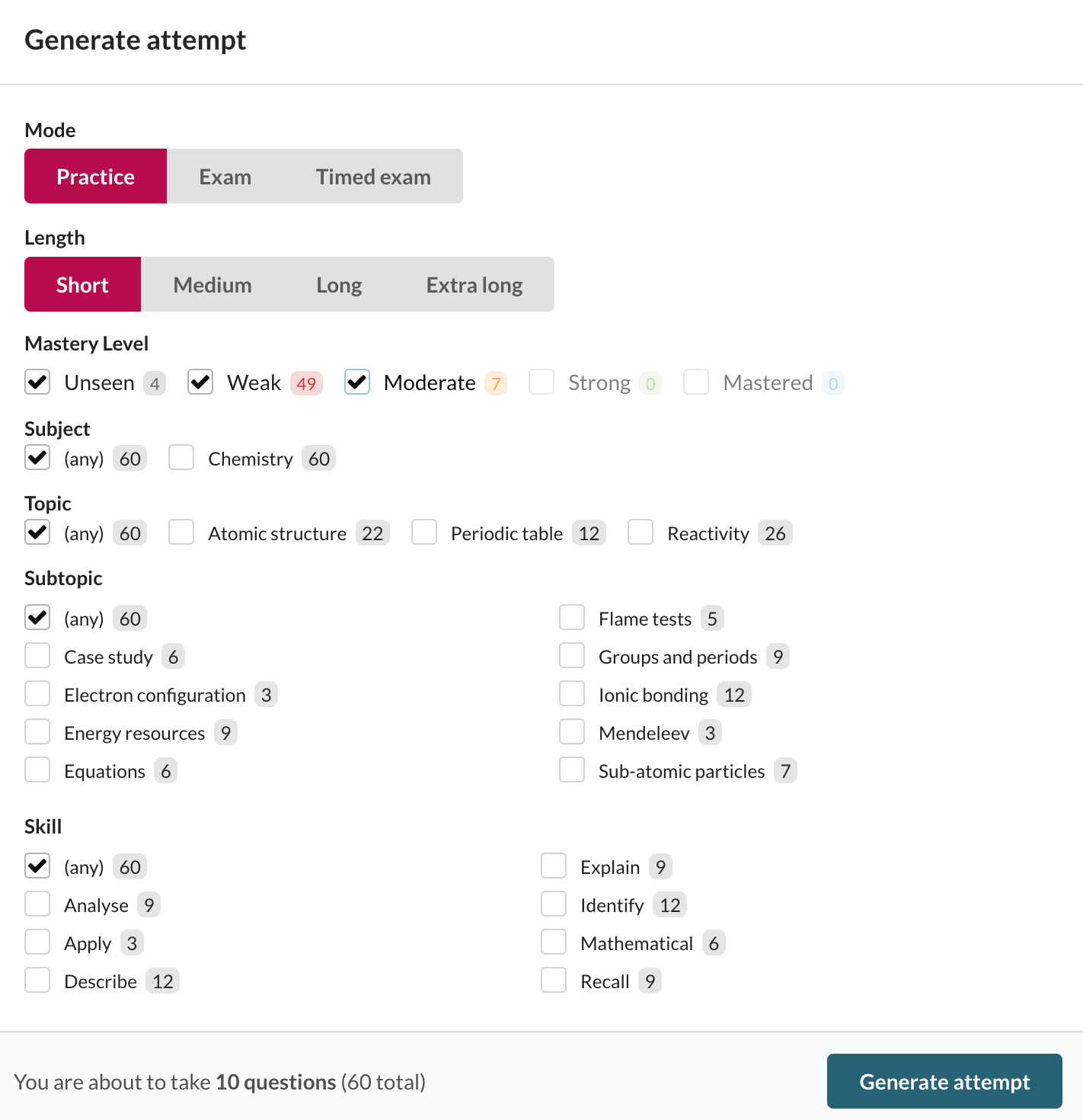
2. Deliver mock exams to simulate real exam conditions
Mock exams on online assessment platforms replicate real exam conditions and enable candidates the ability to take them anytime, anywhere. This enables easier exam distribution for educators and support scalability by catering to more students. Some of the benefits of mock exams include providing:
- Realistic Simulation: Timed conditions and exam tools, such as a highlighter tool and notepad, help students practice in an environment that mirrors the actual test.
- Flexible Access: Exam prep organisations can allow unlimited attempts or restrict retakes, enabling paid reattempts or controlled progression, tailored to their business objectives.
- Automatic Grading: Instant feedback helps learners to quickly identify and address mistakes, while educators save time by eliminating manual grading.
With these capabilities, online mock exams streamline preparation and provide targeted, impactful practice that mimic a formal exam format.
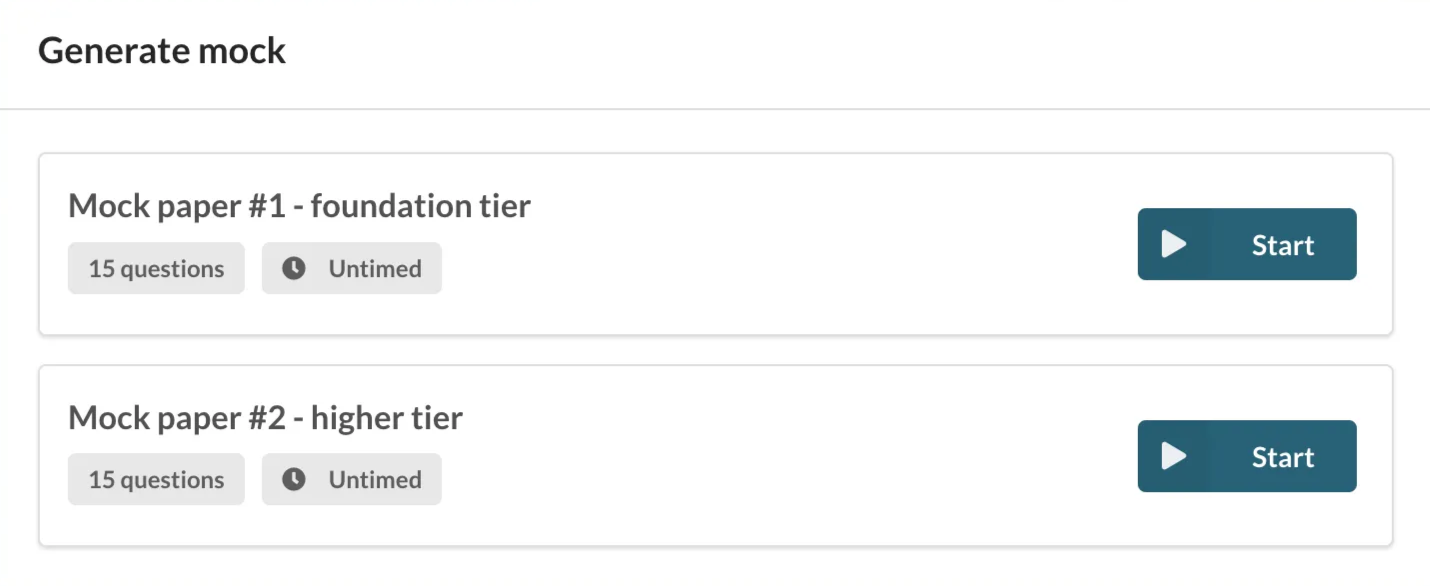
3. Deliver quizzes to cover more topics in less time
Traditional paper-based quizzes are often constrained by the time-consuming process of manual grading by tutors, students or parents, which delays feedback and disrupts the flow of continuous learning. Online exam platforms solve these issues with automated grading, enabling candidates to practice hundreds or thousands of questions in quizzes more efficiently, and explore a wider range of topics in less time.
This flexibility empowers learners to focus on their weaker areas, build confidence through consistent improvement, and reinforce their knowledge for long-term retention, ensuring they are thoroughly prepared for their exams.

4. Diverse question types for engaging exam preparation
Online exam platforms often support a wide range of question types, from multiple-choice and drag-and-drop to essay responses and interactive formats. This variety not only keeps learners engaged but also allows them to encounter questions that simulate the complexity and format of real exams.
By offering diverse question types, these platforms cater to different learning objectives and assessment styles. This flexibility helps educators create well-rounded assessments and enables students to be better prepared for every aspect of their high-stakes exam.

5. Flexible test-taking modes to support every stage of learning
Advanced online assessment platforms offer different test modes, designed to enhance the candidates’ testing experience depending on their stage of learning. Examples include:
- ‘Practice’ mode, which provides immediate feedback after each question, helping students to identify the correct answer and learn from mistakes in real-time.
- ‘Exam’ mode, which delivers results at the end, simulating a traditional exam environment.
- ‘Timed exam’ mode, which replicates real exam conditions to build confidence and improve time management skills. These different modes allow learners to study in a way that works best for them, whether they’re learning the basics, checking how ready they are, or practising under real exam conditions to boost their confidence.
6. Customisable test lengths for personalised study
An advanced online exam platform will allow learners to choose the length of their practice tests, tailoring their study sessions to fit their schedule and goals. For example, candidates can take a ‘short’ test consisting of 10 questions, a ‘medium’ length of 25 questions or a ‘long’ test with 50 questions.
Whether they have a few minutes to spare or want to dive into a longer session, this flexibility ensures learners can make the most of their available time while focusing on their unique needs.

7. Adaptive Spaced Learning algorithm to enhance mastery
Traditional study methods often lead to bias, with students focusing on their strengths while neglecting weaker areas, limiting their overall learning. Additionally, educators often do not have enough time to personalise study plans for each individual learner, making it harder to address their unique needs. Adaptive spaced learning algorithms in exam preparation platforms solve these issues by automatically personalising practice questions based on each learner’s strengths and weaknesses. This ensures that all topics are covered comprehensively, addressing knowledge gaps and reinforcing weaker areas. For educators, this removes the burden of personalising content for every student, freeing up time for more targeted support. Studies show that learners using adaptive systems experience up to a 30% improvement in exam performance.
“Synap is helping my students to reinforce their knowledge of complex medical information. I know more about how my students, on average, use the excellent system. This is helping us to move forward with both educational best practice and educational research publications.” - Harry, Professor of Physiology, Brighton & Sussex Medical School.
8. Provide instant feedback to accelerate learning
One common frustration among students is the lack of timely feedback, which can hinder their ability to understand mistakes and improve. Online exam platforms solve this by providing instant, automated feedback, helping students quickly correct errors. This feedback can be further enriched with images, and videos, making the learning experience more engaging and actionable.
For educators, automated feedback removes the time-consuming task of manual grading, allowing them to focus on personalised support and other teaching priorities.
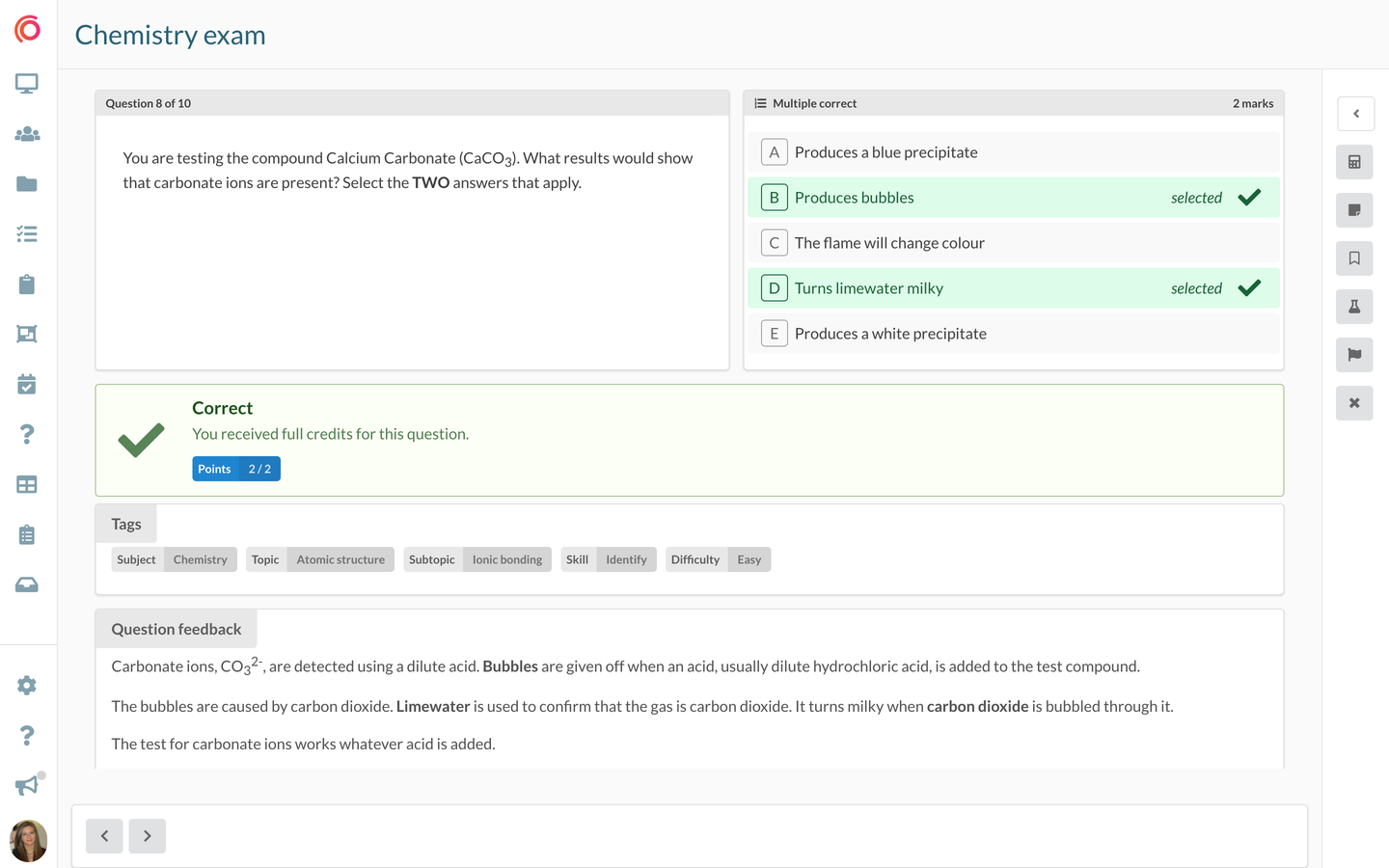
“I find that the information provided as feedback when completing the questions is very easy to understand and manageable. The fact that it explains each of the answers separately is incredibly useful as well.” - Adam, medical student
9. Individual and class performance metrics
Candidates can benefit from instant feedback, which allows them to assess their performance immediately. By monitoring scores, time spent, and other metrics, they can quickly identify areas for improvement and adjust their study strategies.
Educators, meanwhile, can view performance data for individual students and the entire class, enabling them to identify patterns and offer personalised support where needed. Real-time access to this data ensures that both students and educators can address issues promptly and effectively.
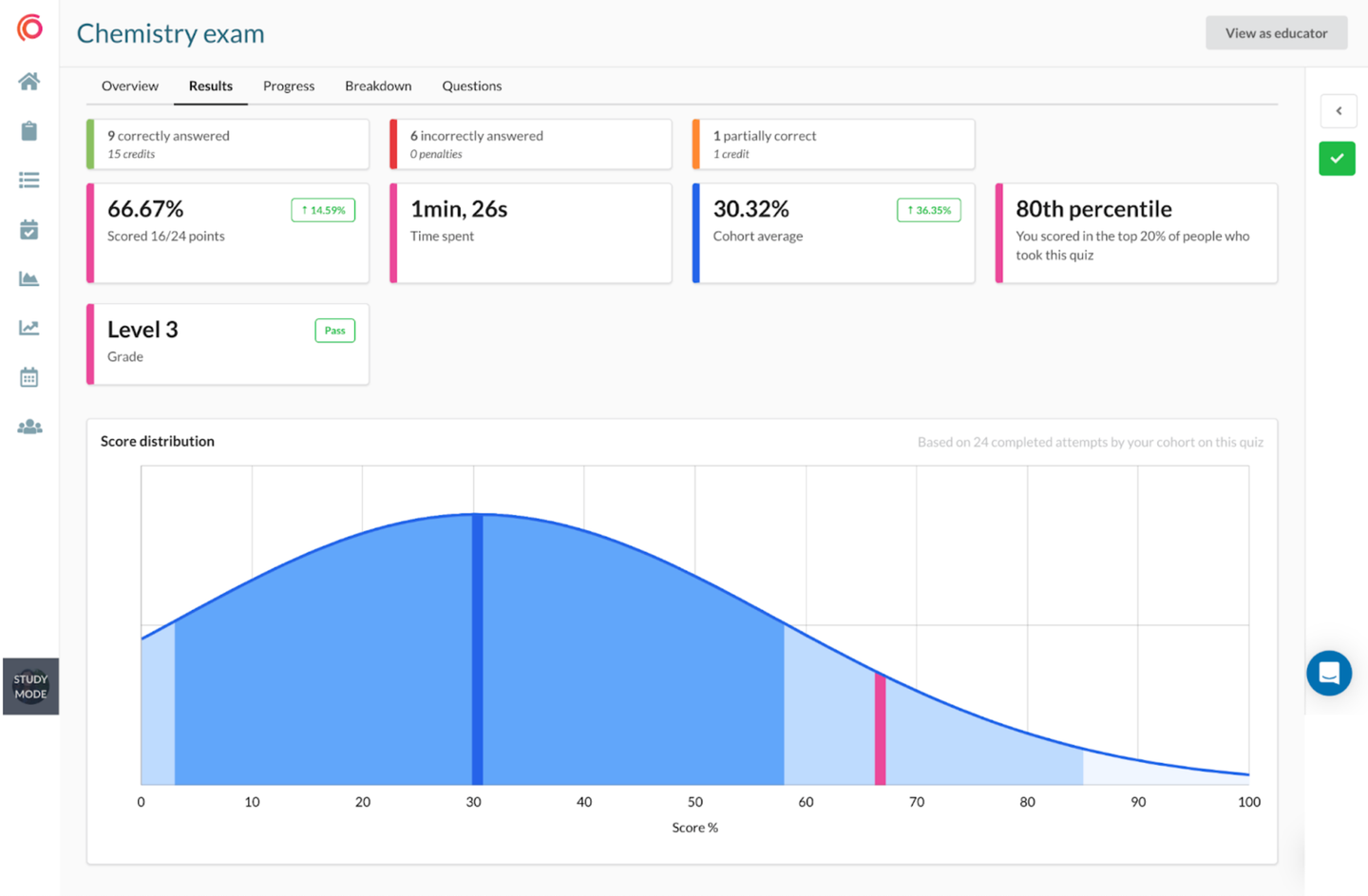
10. Reporting on strengths and weaknesses
Platforms that offer visual breakdowns of performance by subject or topic help students see where they’re excelling and where they need more focus. This insight supports a more targeted and efficient study approach.
These breakdowns are also helpful for educators as they provide a comprehensive view of class performance, allowing them to quickly identify students who may need additional help in specific areas. By comparing individual results with the cohort average, educators can ensure that the entire class is making steady progress.
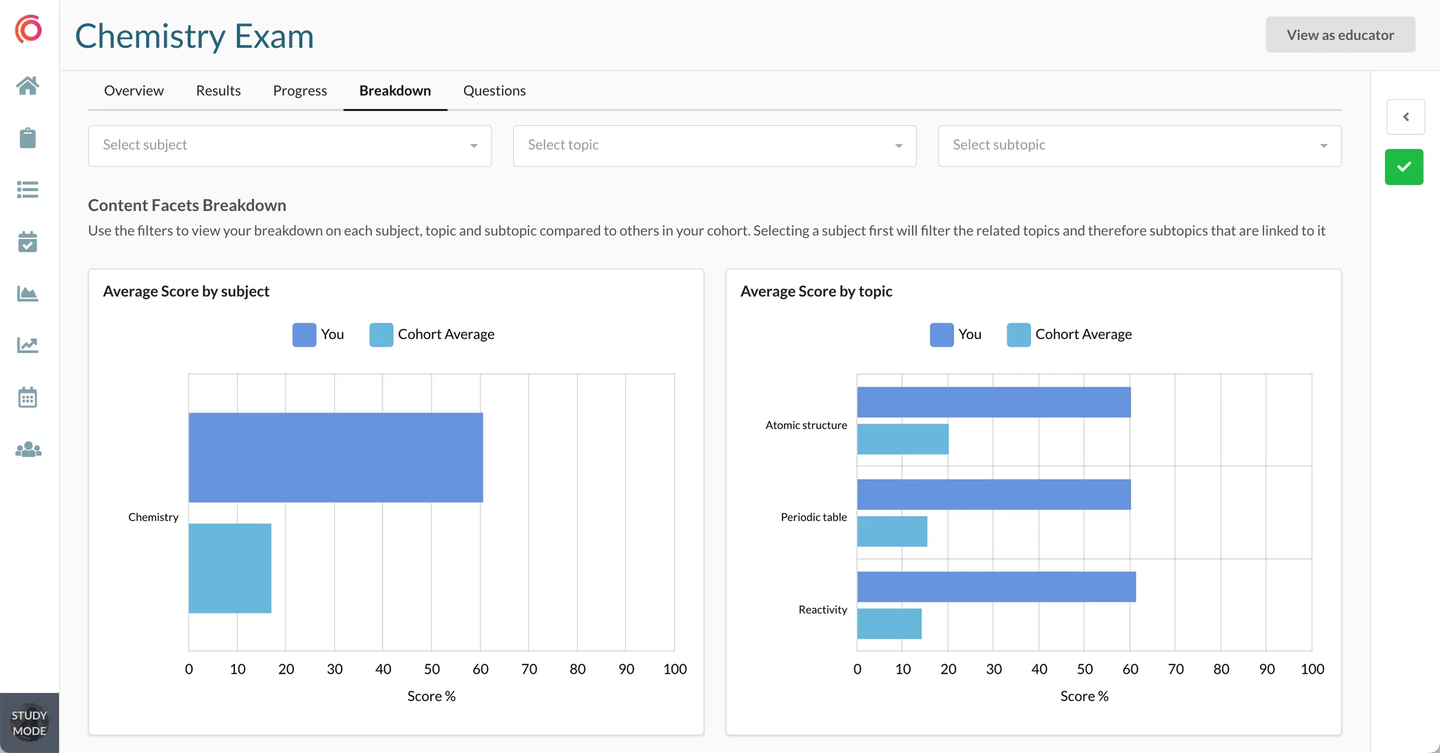
11. Tracking progress over time
Many platforms allow both learners and educators to track progress over time, displaying trends in performance across multiple attempts or study sessions. This ongoing monitoring helps students stay motivated by showcasing improvement, while also highlighting areas that still need attention.
Educators can assess how different teaching methods are impacting student outcomes, making it easier to adapt their approach to better support learners' needs.
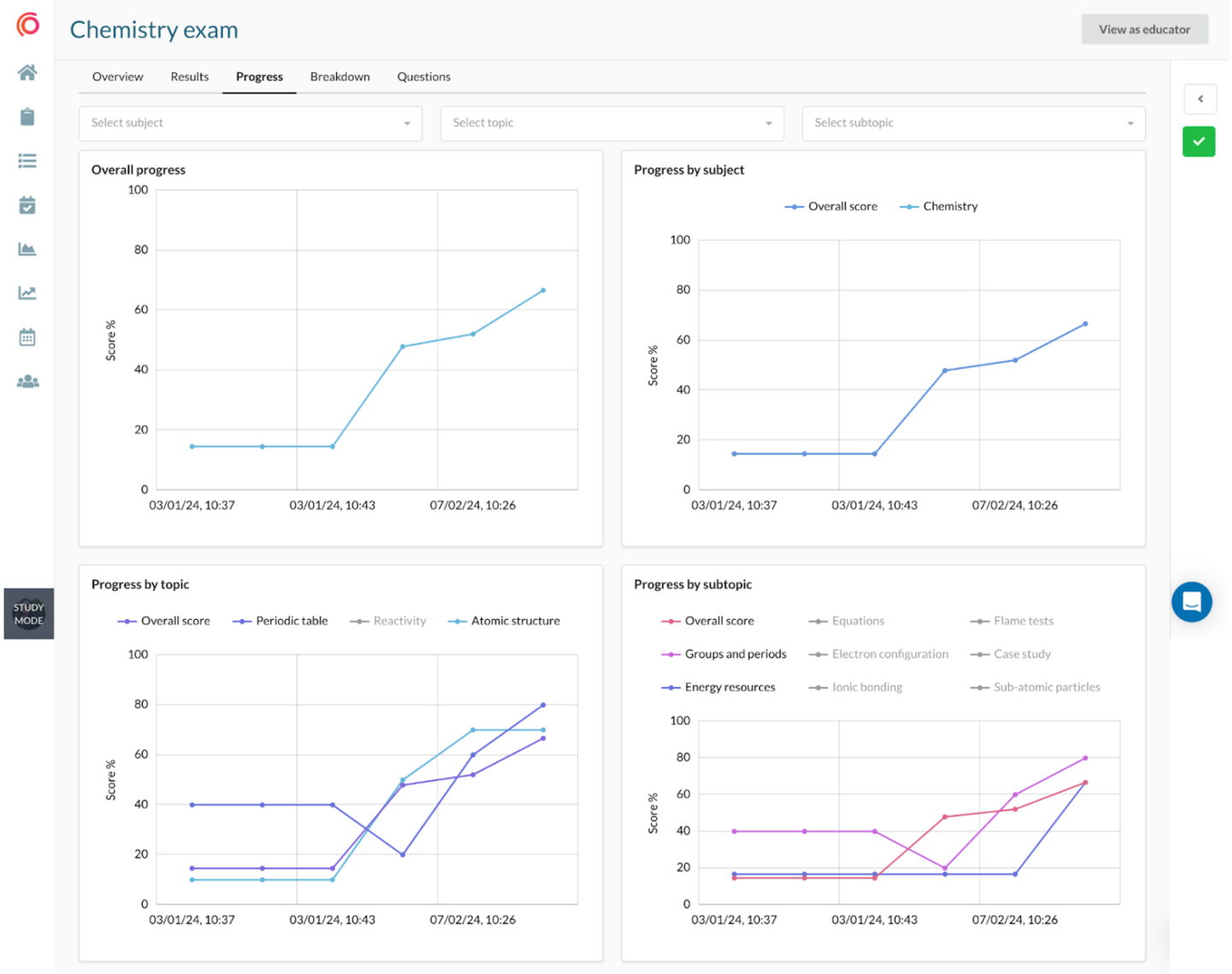
12. Detailed question-level analysis
The ability to track performance on individual questions offers an in-depth view of a student’s strengths and weaknesses. Students can focus on questions they struggled with, review correct answers, and access feedback to enhance their understanding.
This detailed analysis helps educators to pinpoint specific content areas where students may be consistently struggling, enabling to provide more focused interventions.
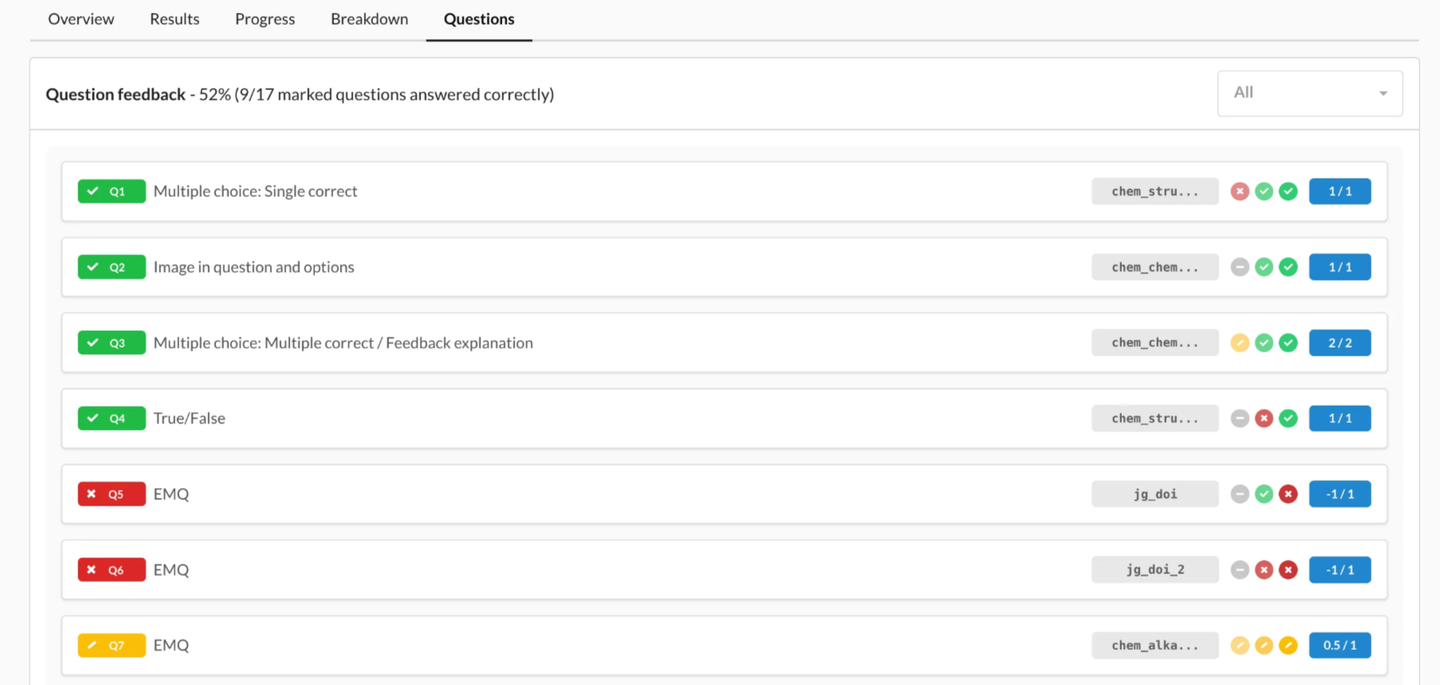
13. Long-term performance insights
Online assessment platforms that offer a student insights dashboard allow both students and educators to track long-term performance trends. This feature helps students and educators understand how their engagement impacts their progress.
Having access to these insights enables both students and educators to make informed decisions about how best to approach future study sessions and teaching methods.
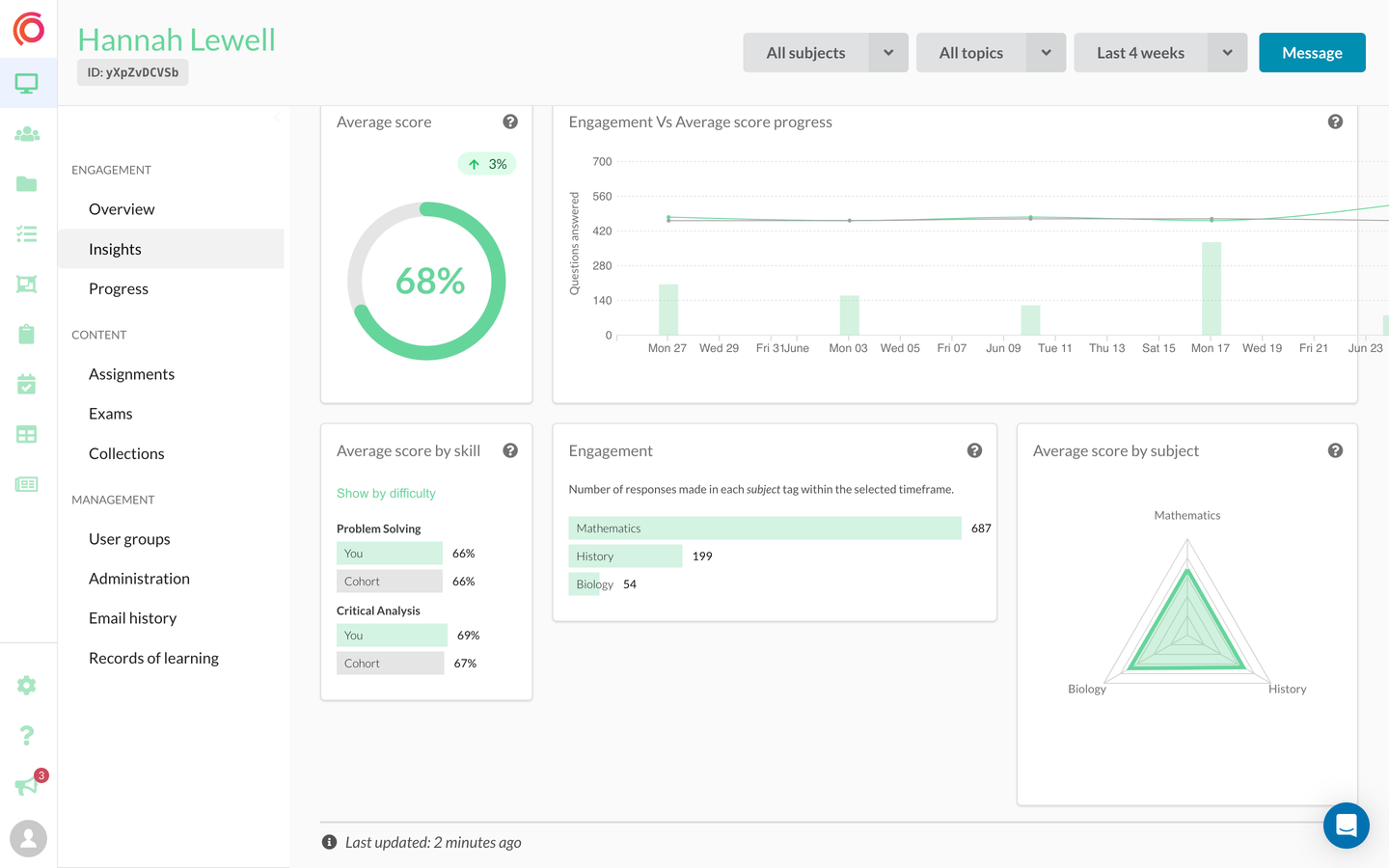
14. Deliver eLearning courses to enhance learning
Online platforms that integrate eLearning course content such as videos, documents and presentations, can significantly enhance the exam preparation process. Unlike traditional in-person delivery methods, eLearning content offers flexibility, allowing students to access materials anytime and anywhere.
This accessibility enables learners to engage with content at their own pace, revisiting complex topics as needed to reinforce their understanding. eLearning content also saves tutors time by allowing them to upload material once. This reduces the need for repeated delivery of the same content, freeing up time for more personalised support.
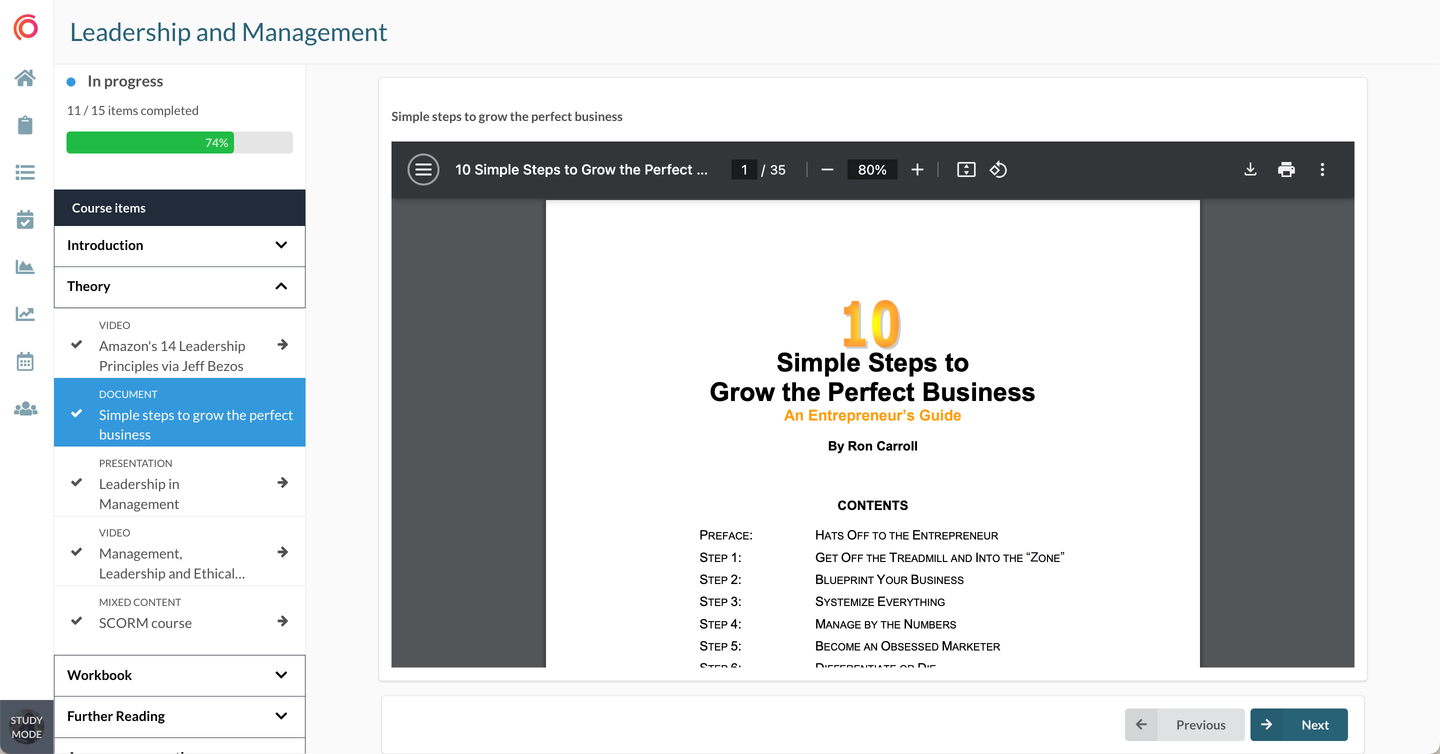
15. Use eCommerce tools to scale your business
An online assessment platform can help you to scale your exam prep business and reach a broader audience. By leveraging digital tools, you can serve a larger number of students from various locations without the limitations of physical space or the need for additional staff.
eCommerce tools play a key role in this scalability. They automate processes such as payments and granting access to content delivery, allowing students to begin their learning immediately after purchasing. This reduces administrative tasks and enables a more efficient tutoring business operation, helping you generate income effortlessly and grow your customer base.
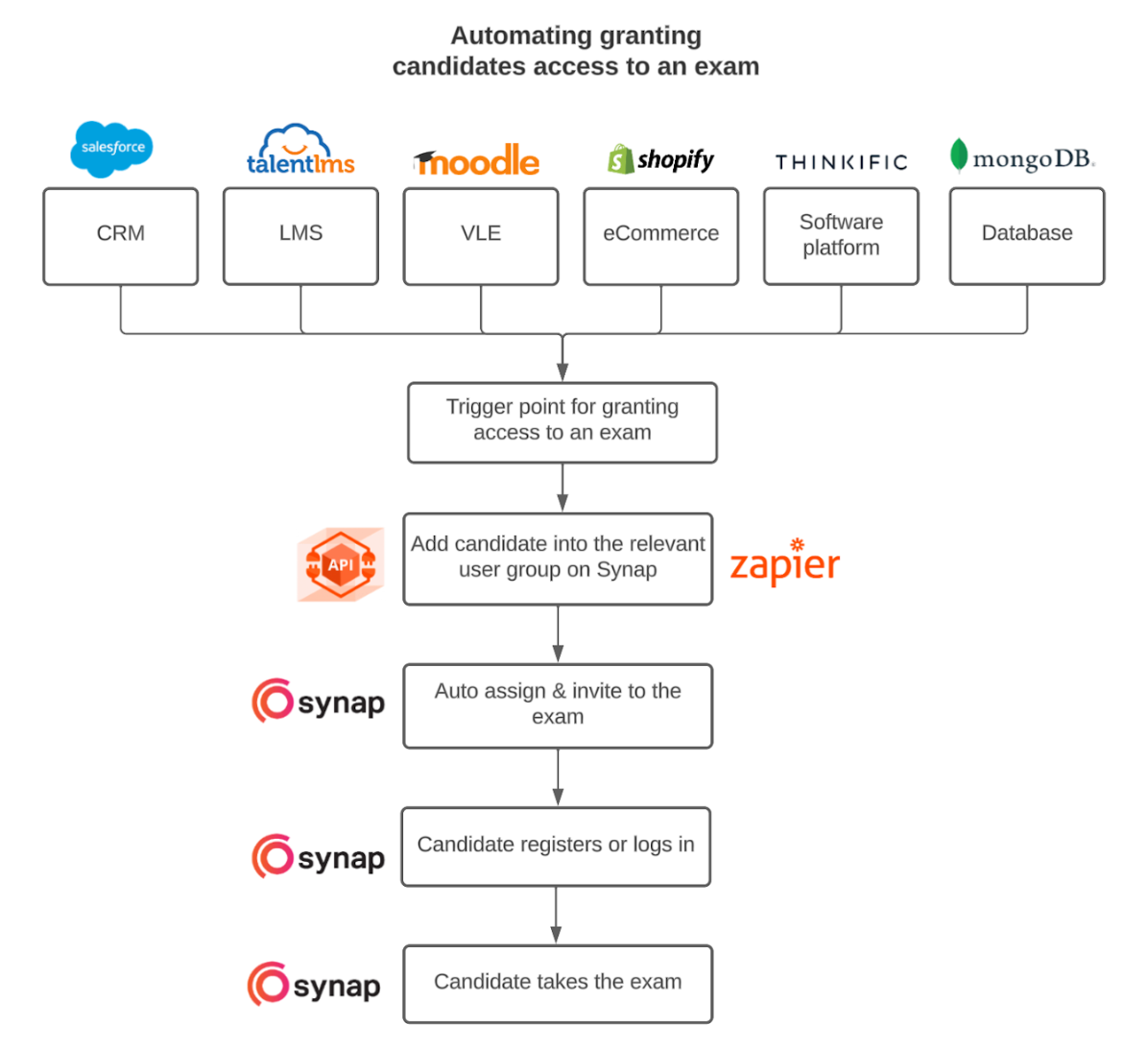
Discover how to elevate your online exam preparation delivery
Transform your exam preparation delivery with Synap’s powerful features. Start your journey with a 14-day free trial today!
